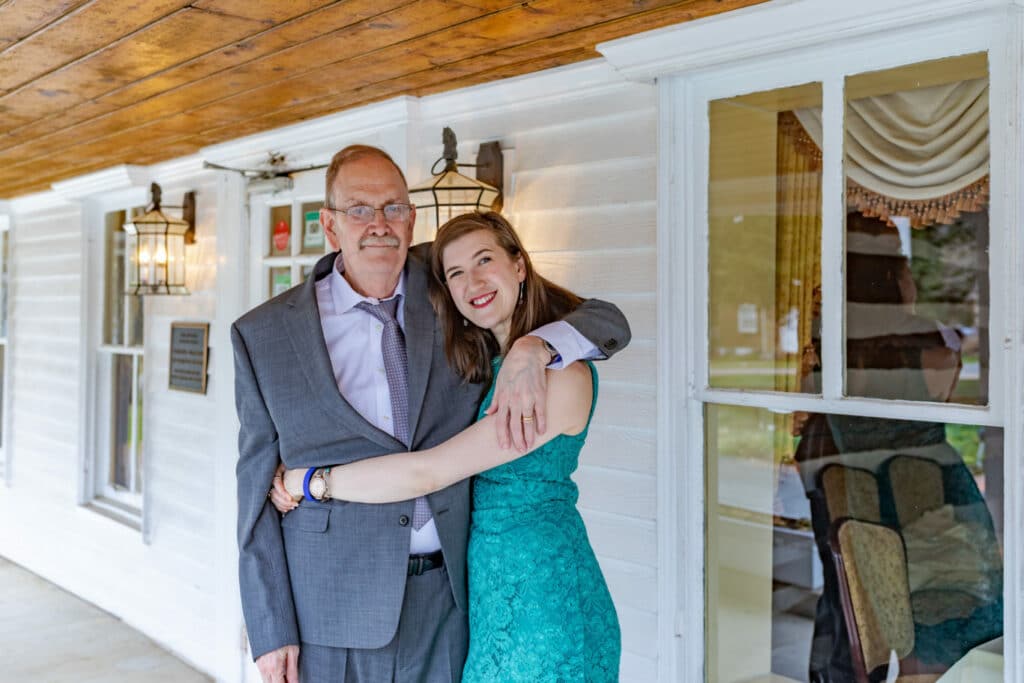Laura Smothers-Chu

His signs of MCI began three years before, when he could no longer balance his checkbook, or do our family’s taxes. Dad had always been excellent with numbers, so I knew something was wrong. The list of things that gave him trouble got longer and longer, and I knew he was progressing into dementia. I was only 28 years old.
June 14th, 2019
My dad was 68 when he was finally diagnosed with mild cognitive impairment (MCI). His signs of MCI began three years before, when he could no longer balance his checkbook, or do our family’s taxes. Dad had always been excellent with numbers, so I knew something was wrong. The list of things that gave him trouble got longer and longer, and I knew he was progressing into dementia. I was only 28 years old.
At the time, I couldn’t find anyone my age who could relate to my family’s struggle with dementia. As an only child with a mom not ready to accept Dad’s condition, I stepped up. The only problem? My parents lived in Pennsylvania, and I was in Virginia—an almost 4-hour drive away. Despite the distance, I took the lead in protecting my parents and advocating for their care. I jumped into my search for all things dementia. I tried to learn as much as possible from experts and my work connections in the healthcare industry. And of course—like we all do—I Googled.

But the more I researched online, the more overwhelmed, depressed and confused I felt. I had no idea what to do first. All resources focused on tips for the caregiving parent. (Several years later, this is still the case.) It was unclear what I could do as a long-distance daughter. To me, this was a missed opportunity for long-distance children like myself to share the burden of dementia. So I became certified in teaching dementia and advising elders, and I started Befriended Heart.
Befriended Heart is a for-purpose business just for long-distance daughters like me. I empower them with positive and practical steps to help them navigate their parents’ dementia. I also have a YouTube Channel called Joy in Dementia. Here, I interview guest experts in various fields that intersect with dementia. I’ve interviewed a nurse about palliative vs. hospice care, a nutritionist on how to delay/prevent Alzheimer’s and a guru about all things Medicare. This year, I plan to interview a financial planner, an elder law attorney and a paid caregiver. I share additional information on my website.
As far as my dad, I’m pleased to say I recently moved him into an assisted living place specifically for memory care. The facility uses a research-based model that’s a great fit for Dad. And he’s now living only 10 minutes from my house. Although my parents will finally live closer to me by the end of the summer, I have not forgotten my struggle. I still believe long-distance caregiving children need a voice. With dementia, many times, we are better able to see the forest through the trees. We aren’t overwhelmed on a day-to-day basis just trying to survive, like our caregiving parents. So it’s up to us to use our objectivity, time and research skills to help our parents. We can plan ahead and make the best of a dementia diagnosis, even if our parents aren’t ready to do it themselves.
Helping Your Loved One Find the Right Doctor
Since dementia entered my life, I’ve gained a ton of insights from my personal and professional experience. But the one thing I really wish I did was be more involved in selecting doctors for my parents. It wasn’t enough to research health care professionals online. I wish I had met with them in person too before my parents worked with them.
The sad truth is that elder financial exploitation runs rampant in the United States. All elders are vulnerable, especially those with dementia, and their caregivers, who are desperate for answers. The best way to prevent this is vetting. Vetting is essential to ensuring your parents are not taken advantage of financially. I recommend trusting your gut when it comes to evaluating professionals, and knowing the red flags. My family learned this the hard way. Now I make an effort to meet all professionals working with my parents and evaluate them as best as I can. If I have a bad feeling about anyone, including doctors, I share this with my mom, and we find someone different.
What Doctors Should Know
Many people tell me they’re most frustrated with their forgetful parents’ doctors. They say that primary care physicians refuse to acknowledge their parents’ dementia symptoms. For this reason, these doctors refuse to test for dementia. This is a huge problem. Without a cognitive assessment, it makes lives even harder for these families. In fact, according to UsAgainstAlzheimer’s, “primary care doctors must perform cognitive assessments for Medicare Annual Wellness visits.” But few doctors or families know about this requirement. So time, which becomes more and more valuable, starts to run out. Time to rule out other illnesses that may cause dementia-like symptoms. Or time for the family to accept and embrace a dementia diagnosis and make the best of it.
So What Can Long-Distance Caregivers Do?
In addition to advocating for better care, children of parents with dementia can learn strategies in the short-term to prevent stress in the long-term. They can learn how to create a new loving relationship with their forgetful parent. They can learn to find balance in their own lives despite dementia. And they can help update their parents’ financial, legal and medical plans for the future. That way, there’s peace of mind for everyone, and more time to create new memories and live in the moment. To me, this is discovering joy in dementia.